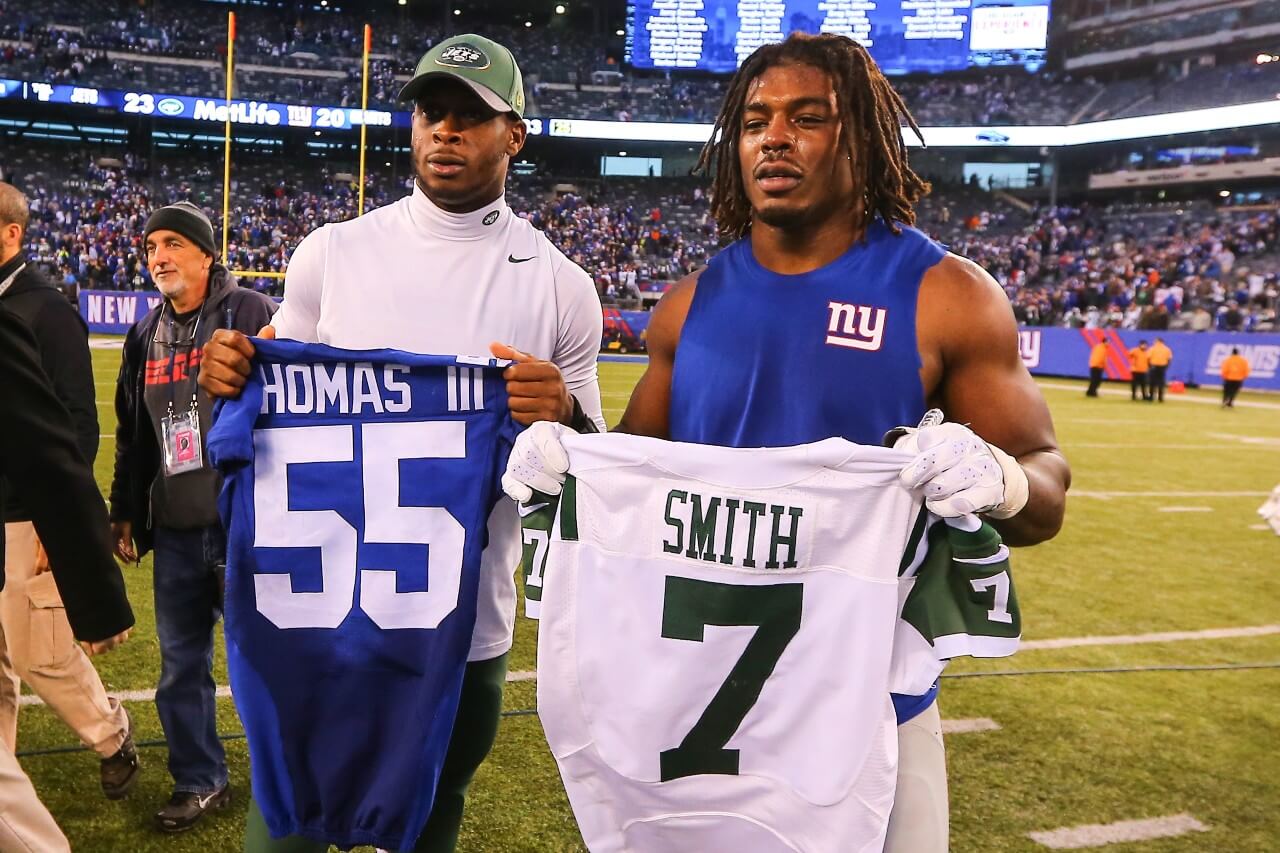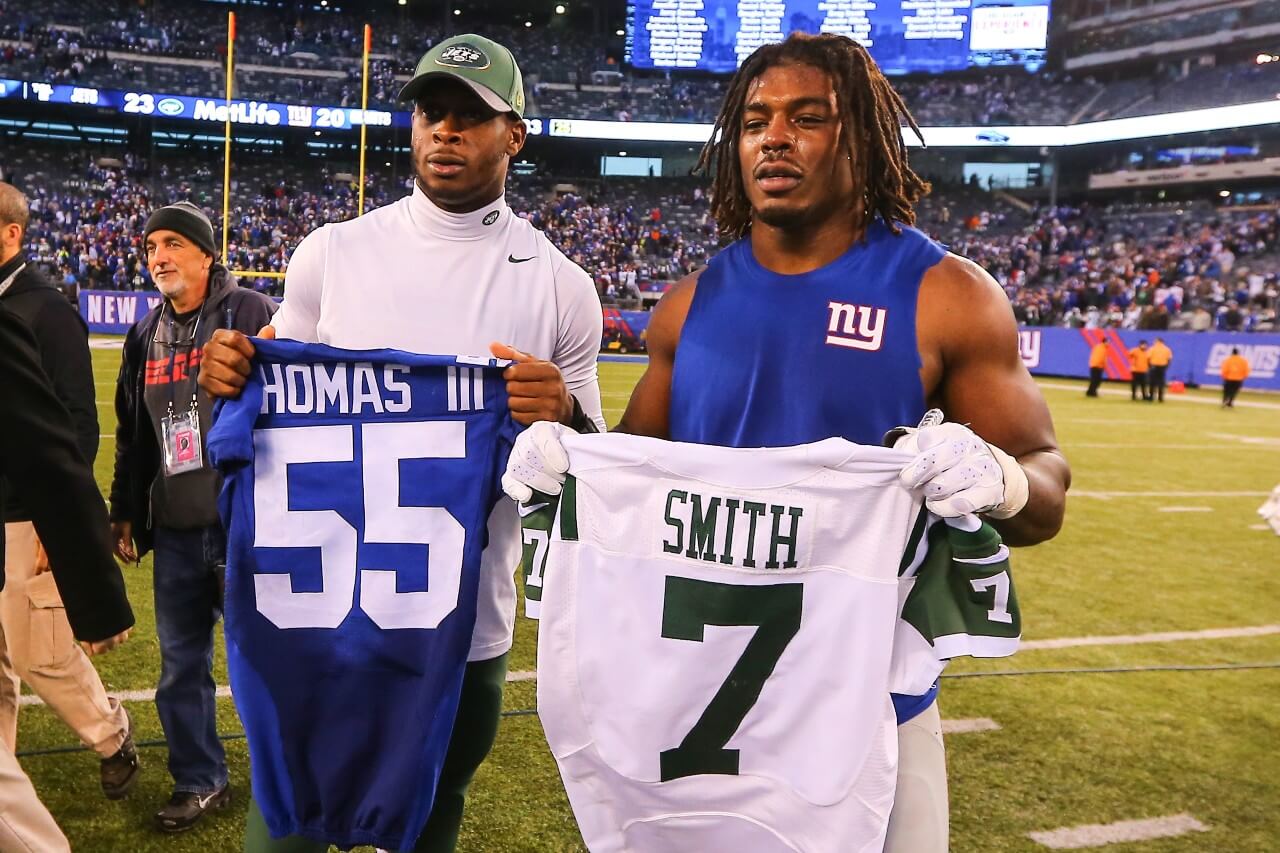
Former NY Giants Player J.T. Thomas III Talks About Life With ADHD
J.T. Thomas III, a former football player for NFL teams such as the New York Giants, Chicago Bears, and Jacksonville Jaguars, reflected on his mental health journey. Thomas spoke with Showbiz Cheat Sheet about his experience with Attention Deficit Hyperactivity Disorder (ADHD) and how he learned to not just survive but thrive after receiving his diagnosis.
J.T. Thomas’ wife encouraged him to get evaluated for ADHD

Thomas decided to get evaluated for ADHD after his wife, Morgan, recognized some of his symptoms. He says no one addressed the possibility he might have ADHD before this. Thomas wasn’t diagnosed with ADHD until he was 24 years old.
“I met my now-wife Morgan in 2012,” Thomas tells Showbiz Cheat Sheet. “She was quickly able to recognize my ADHD and encouraged me to get evaluated and treated. Ironically, she is now a clinical psychologist.”
Thomas sought treatment after joining the Jaguars. “Once I got traded to the Jaguars, I saw a psychiatrist, I believe in 2014, and I was officially given the diagnosis and medication,” says Thomas. “Before she pointed out my symptoms in the DSM (Diagnostic and Statistical Manual of Mental Disorders), I wasn’t ever really aware of what I was going through. No one had ever mentioned it to me before her.”
How ADHD has affected J.T. Thomas’ personal and career life

Thomas, who was a linebacker with the NFL, says ADHD didn’t affect him that much when he played football because he was so focused on the game. He loved the sport, so it was easy for him to put most of his attention there.
“In the NFL, it didn’t impact me much because football was my hyperfocus activity,” Thomas tells us. “However, I’ve always had a hard time being on time and organizing my life as a whole. I think the NFL enabled my ADHD in some ways because they do so much for you.”
Since Thomas’ ADHD symptoms were not as evident when he was playing football, this likely delayed his diagnosis. He says his symptoms were almost “invisible” when he played for the NFL.
“ADHD seemed much more invisible for me as an athlete,” says Thomas. “My symptoms, like inattention, didn’t show up much because I could really lock in on football. Other symptoms, like hyperactivity and impulsivity, are more socially acceptable as a football player on the field. Over the years, it really hid my diagnosis unless you knew me on a really personal level.”
Managing ADHD symptoms
Thomas says it is important for him to manage his ADHD because he is at a different phase in his life. He has a family now, and it’s vital for him to make sure he remembers to do certain things for his wife and daughter (ADHD can often result in forgetfulness). He is also focused on his work with the J.T. Thomas Foundation.
“Post-NFL, I think my ADHD plays a much different role than when I was an athlete. Now, I have to be mindful about how I spend my time and where my hyperfocus gravitates now that it’s not football. I have more responsibilities like a wife and a daughter, so it’s really important for me not to be forgetful and manage my time effectively. My medication really helps me with this.”
Thomas is grateful for the help he has received to manage his condition. In addition to medication, he says he relies on family support.
“These days, I just rely on my medication and lots of support from my wife,” says Thomas. “She keeps everything in order, and I do my best not to be too hard on myself when I slip up and forget something or make us late.”
What J.T. Thomas wants people to know about ADHD
Thomas learned to embrace his ADHD diagnosis. These days, his top priority is taking care of his mental health. He focuses on the positive aspects of having this condition.
“It’s a really cool diagnosis,” says Thomas. “I think of it as my superpower. There’s a lot of [negativity] toward ADHD and sometimes people judge your character as if you’re acting a certain way on purpose. The truth is, we can’t help it and we’re actually very aware of our flaws, but a lot of people with ADHD are sensitive to criticism because we’re used to receiving it.”
Thomas says it’s important to give yourself “grace” and allow yourself to be just who you are. He says some people won’t understand you or what you’re experiencing. Try to be gentle with yourself and not get discouraged when someone reacts negatively to a certain behavior.
“We need to give ourselves grace because sometimes other people don’t understand us,” says Thomas. “Focus on the positive aspects of ADHD. For me, it fuels my creativity and I never run out of good ideas!”
J.T. Thomas’ advice
Thomas offered advice for those who suspect they might have ADHD. He believes it’s never too late to get an evaluation.
“There’s no harm getting yourself evaluated,” says Thomas. “If you do have ADHD, there are lots of options to consider for treatment. Medication is a great option if that’s what works best for you. I think it really depends on how well you can function and how your symptoms impact your daily life. It’s a lifelong diagnosis, but it’s nothing to be ashamed of. I’ve definitely learned how to embrace it!”
Follow Sheiresa Ngo on Twitter.


